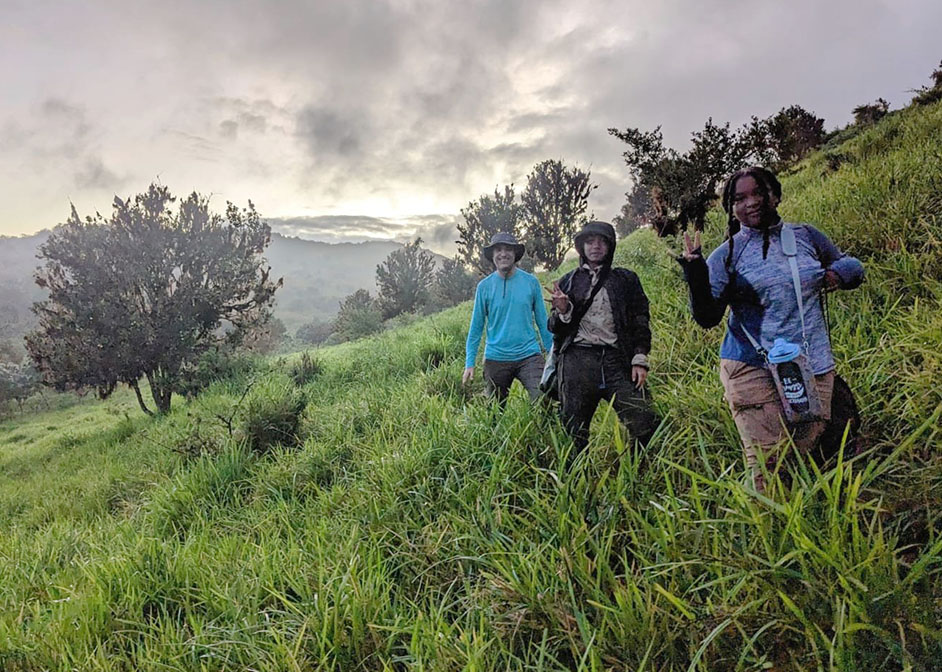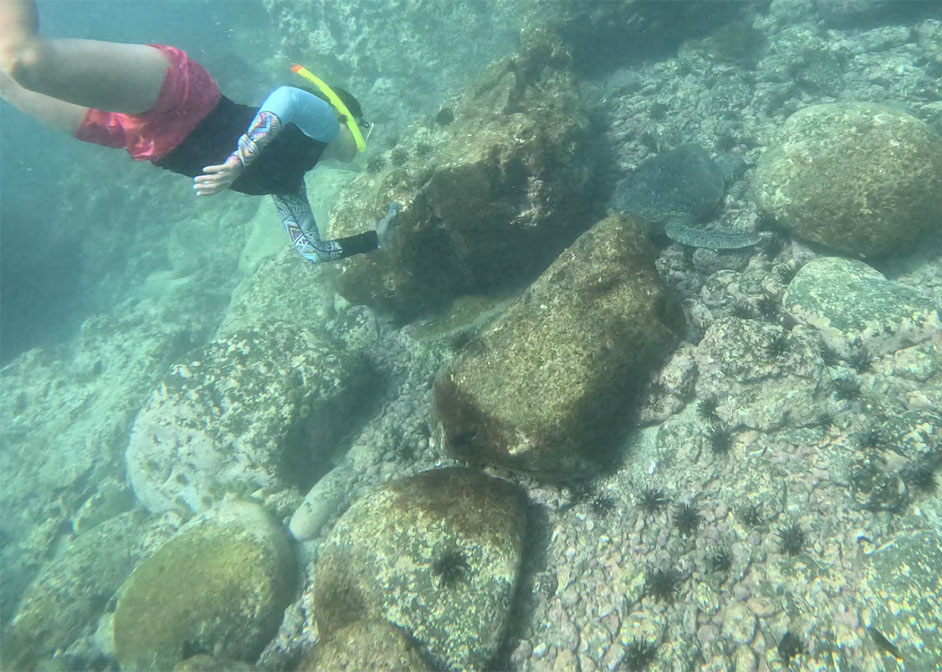GalápaGo!: Students Learning Abroad
Research-Based Course Immerses Students in the Galápagos Islands
With its distinctive dark gray body and scarlet mouth, the lava gull is a special sight to behold. Found only on the Galápagos Islands, it is believed to be the rarest gull in the world with only 300–600 still in existence.
You can imagine Kevin Chen’s excitement when he spotted his first lava gull during the University of Houston’s GalápaGo! Research-Based Learning Abroad course. A biology major, Chen and his classmates spent a month in the Galápagos archipelago conducting research with scientists from across the globe while immersing themselves in the local culture.
 “Our field work revolved around going on miles-long hikes through beaches, cliffs and lava rocks in the hopes of catching the elusive bird,” Chen said. “We even did a snorkeling trip to spot the gulls.”
“Our field work revolved around going on miles-long hikes through beaches, cliffs and lava rocks in the hopes of catching the elusive bird,” Chen said. “We even did a snorkeling trip to spot the gulls.”
Studying the fundamentals of science in a classroom will undoubtedly educate a student on how to conduct research, but nothing compares to the feeling of swimming through blue waters to collect samples or hiking through rain and lush landscapes to gather data. Or meeting with locals to hear their perspectives on the changing environment.
Twenty-six students and four faculty members made the trip this summer to San Cristóbal Island, the easternmost island in the archipelago, to collaborate on research at the Galapagos Science Center, a research hub for international scientists run by the University of North Carolina at Chapell Hill and the Universidad San Francisco de Quito.
Program Enables Professional and Personal Growth
“The program is about enabling professional and personal growth through an experience abroad,” said Tony Frankino, associate professor and associate chair of undergraduate affairs in NSM’s Department of Biology and Biochemistry. He helped create the course in 2015.
 “The class is also about the experiences we create for our students in preparation for the trip and in reflection about their experiences afterwards,” he added.
“The class is also about the experiences we create for our students in preparation for the trip and in reflection about their experiences afterwards,” he added.
Students take a preparatory course that readies them for research and cultural immersion in the Galápagos. They discuss topics in geology, evolutionary biology, history and conservation on the islands.
Marc Hanke, instructional associate professor at the Honors College, and Frankino have organized the program for years. They collaborate in developing and executing the program with faculty from the Department of Biology and Biochemistry, Ricardo Azevedo, Ann Cheek, Jacob Daane, Martin Nuñez and Rebecca Zufall.
In addition to co-teaching the preparatory course and traveling with the students, these faculty members participate in activities like student scuba certification classes, executing a required student swimming proficiency test and organizing cohort-building activities for the group.
Studying Animal Species Only Found on the Galápagos
“The Galapágos was nothing like I imagined in the best way possible,” said Larose Mutombo, a biochemistry major. “No textbook can describe how the Galápagos smells, sounds and feels. It’s hard to describe; you have to experience the Galápagos.”
And experience it they did. Students were split into groups and assigned to different research projects every week, including studying the nesting of Galápagos petrels, a seabird endemic to the island; identifying sea turtles and quantifying their use of space; analyzing lava lizard behavior; determining lava gull and sea lion population density and distributions; and collecting and organizing microplastics, which can have toxic effects on fish and other aquatic life.
Post baccalaureate student Ingrid Kooda spent one week identifying sea turtles and the following week analyzing the behaviors of lava lizards. Her group snorkeled around several beaches taking photos of sea turtles before uploading them to a database to identify individual turtles and better understand their travel and return patterns.
The students were mentored by Lorissa Saiz, a doctoral biology student. As an undergraduate, she went on the trip in 2019.
“As an instructor this year, I had research discussions with our faculty and USFQ faculty that I wasn’t able to have before,” Saiz said. “I’m an evolutionary geneticist; there were many times when I could see myself collaborating in the future with the researchers I met on the island this year.”
The National Science Foundation awarded the faculty team a grant in 2020 to provide scholarships for students with financial need. Students, like Mutombo, were awarded funding to offset the trip’s cost. This was the first year the award could be used due to the pandemic halting trips to the Galápagos.
“This program allows students to not only visit these fantastic cultures but to provide tangible support to the preservation and understanding of the natural wonders of the Galápagos,” said student Ingrid Kooda. “As much as I love visiting unique locations as a tourist, being able to contribute to the communities I visit is a much more fulfilling experience.”
Rebeca Hawley, University Media Relations

